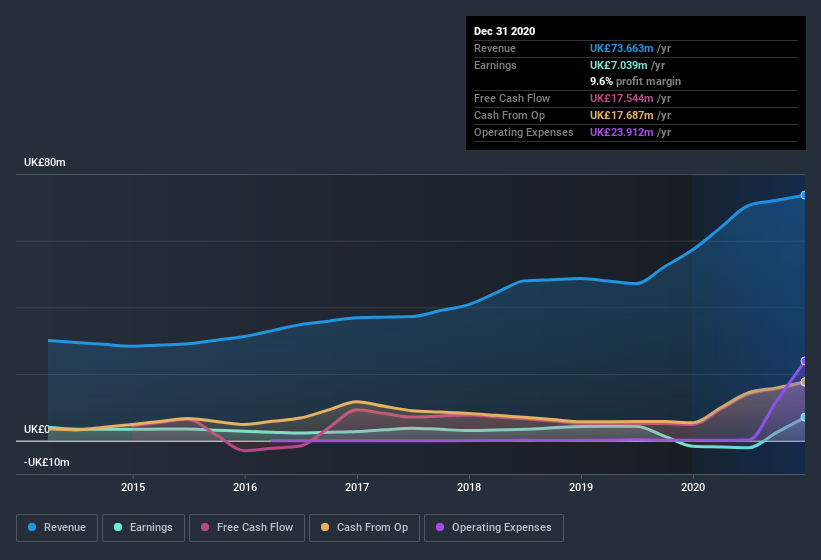- United Kingdom
- /
- Professional Services
- /
- AIM:SAG
Statutory Profit Doesn't Reflect How Good Science Group's (LON:SAG) Earnings Are

Science Group plc (LON:SAG) just reported healthy earnings but the stock price didn't move much. We think that investors have missed some encouraging factors underlying the profit figures.
See our latest analysis for Science Group

A Closer Look At Science Group's Earnings
One key financial ratio used to measure how well a company converts its profit to free cash flow (FCF) is the accrual ratio. In plain english, this ratio subtracts FCF from net profit, and divides that number by the company's average operating assets over that period. You could think of the accrual ratio from cashflow as the 'non-FCF profit ratio'.
That means a negative accrual ratio is a good thing, because it shows that the company is bringing in more free cash flow than its profit would suggest. While having an accrual ratio above zero is of little concern, we do think it's worth noting when a company has a relatively high accrual ratio. To quote a 2014 paper by Lewellen and Resutek, "firms with higher accruals tend to be less profitable in the future".
Science Group has an accrual ratio of -0.30 for the year to December 2020. Therefore, its statutory earnings were very significantly less than its free cashflow. In fact, it had free cash flow of UK£18m in the last year, which was a lot more than its statutory profit of UK£7.04m. Science Group shareholders are no doubt pleased that free cash flow improved over the last twelve months. However, as we will discuss below, we can see that the company's accrual ratio has been impacted by its tax situation.
That might leave you wondering what analysts are forecasting in terms of future profitability. Luckily, you can click here to see an interactive graph depicting future profitability, based on their estimates.
An Unusual Tax Situation
In addition to the notable accrual ratio, we can see that Science Group received a tax benefit of UK£647k. This is meaningful because companies usually pay tax rather than receive tax benefits. Of course, prima facie it's great to receive a tax benefit. And given that it lost money last year, it seems possible that the benefit is evidence that it now expects to find value in its past tax losses. However, the devil in the detail is that these kind of benefits only impact in the year they are booked, and are often one-off in nature. Assuming the tax benefit is not repeated every year, we could see its profitability drop noticeably, all else being equal. While we think it's good that the company has booked a tax benefit, it does mean that there's every chance the statutory profit will come in a lot higher than it would be if the income was adjusted for one-off factors.
Our Take On Science Group's Profit Performance
While Science Group's accrual ratio stands testament to its strong cashflow, and indicates good quality earnings, the fact that it received a tax benefit suggests that this year's profit may not be a great guide to its sustainable profit run-rate. Considering all the aforementioned, we'd venture that Science Group's profit result is a pretty good guide to its true profitability, albeit a bit on the conservative side. If you'd like to know more about Science Group as a business, it's important to be aware of any risks it's facing. Be aware that Science Group is showing 3 warning signs in our investment analysis and 1 of those makes us a bit uncomfortable...
In this article we've looked at a number of factors that can impair the utility of profit numbers, as a guide to a business. But there is always more to discover if you are capable of focussing your mind on minutiae. Some people consider a high return on equity to be a good sign of a quality business. So you may wish to see this free collection of companies boasting high return on equity, or this list of stocks that insiders are buying.
When trading Science Group or any other investment, use the platform considered by many to be the Professional's Gateway to the Worlds Market, Interactive Brokers. You get the lowest-cost* trading on stocks, options, futures, forex, bonds and funds worldwide from a single integrated account. Promoted
New: Manage All Your Stock Portfolios in One Place
We've created the ultimate portfolio companion for stock investors, and it's free.
• Connect an unlimited number of Portfolios and see your total in one currency
• Be alerted to new Warning Signs or Risks via email or mobile
• Track the Fair Value of your stocks
This article by Simply Wall St is general in nature. It does not constitute a recommendation to buy or sell any stock, and does not take account of your objectives, or your financial situation. We aim to bring you long-term focused analysis driven by fundamental data. Note that our analysis may not factor in the latest price-sensitive company announcements or qualitative material. Simply Wall St has no position in any stocks mentioned.
*Interactive Brokers Rated Lowest Cost Broker by StockBrokers.com Annual Online Review 2020
Have feedback on this article? Concerned about the content? Get in touch with us directly. Alternatively, email editorial-team (at) simplywallst.com.
About AIM:SAG
Science Group
Operates as a science and technology consultancy and systems businesses in the United Kingdom, other European Countries, North America, and Asia.
Flawless balance sheet and undervalued.
Market Insights
Community Narratives



